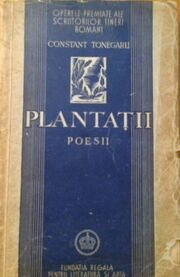
Front cover of Plantații (first edition)
Constant Tonegaru (common rendition of Constantin Tonegaru; February 26, 1919–February 10, 1952) was a Romanian avant-garde, who ended his brief career as a political prisoner and victim of the communist regime. Known for his bohemianism, he was the author of celebrated escapist and individualist poems, characteristic for the World War II generation in Romanian literature, and closely related to the works of his friends Geo Dumitrescu, Dimitrie Stelaru and Ion Caraion (Albatros group). Together with them, Tonegaru stands for one of the last waves to pass through Sburătorul, a modernist literary society formed around literary critic Eugen Lovinescu.
At the same time an anti-fascist and anti-communist, Tonegaru participated in culturally subversive activities against the authoritarian Ion Antonescu regime, and contributed to Dumitrescu's Albatros magazine until it was closed down by Antonescu's censorship apparatus. Before 1945, he was also affiliated with Vladimir Streinu's Kalende magazine, and completed work on his volume Plantații ("Plantations"), a large portion of which is dedicated to shocking images of war on the Eastern Front. After the Soviet Union began its occupation of Romania, Tonegaru was also an outspoken critic of cultural persecution, and, with fellow writers Streinu, Pavel Chihaia and Iordan Chimet, created the Mihai Eminescu Association, a charitable organization and cultural forum whose goal was providing help to marginalized authors.
Implicated in a trial of anti-communist resistance fighters, Constant Tonegaru was sentenced to a two-year term, and sent to Aiud prison, where the dire living conditions resulted in a severe lung disease. He died soon after his release, and was fully recovered as a poet only after the Romanian Revolution of 1989, largely owing to the care of his friends and confidants Chimet, Chihaia and Barbu Cioculescu. Tonegaru's biography is often described as symbolic of the fate of his entire generation, which was decimated by communist persecution and prevented from affirming itself culturally.